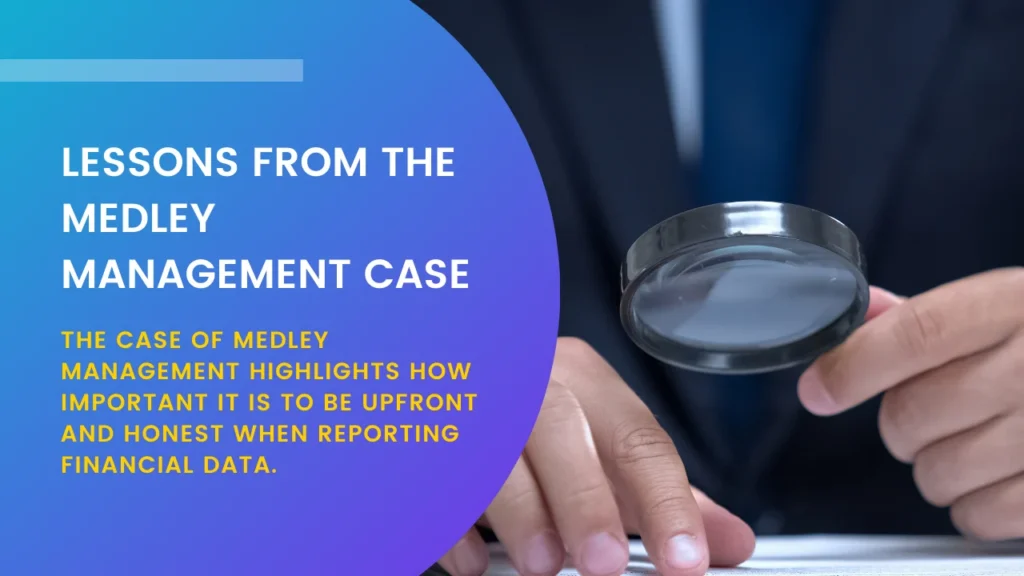Introduction
As a result of accusations leveled by the United States Securities and Exchange Commission (SEC), the publicly-traded asset management firm Medley Management, Inc. has encountered considerable regulatory and legal hurdles. These allegations, which were resolved in 2022, centered on claims that Brook B. Taube and Seth B. Taube, the former co-CEOs of Medley Management, misled clients and investors regarding the company’s financial situation and potential for future growth. This article explores the history, details of the Medley Management SEC charges, enforcement and penalties that followed, and, finally, the wider consequences for Medley Management and the asset management industry as a whole.
Background of Medley Management SEC
The primary goal of establishing Medley Management was to meet the investment advisory needs of institutional clients. In 2014, the company decided to take the asset management industry by storm by going public. But once the SEC began an official investigation into the company’s operations, everything changed.
SEC Charges Against Medley Management

Based on their findings, the SEC concluded that Medley Management, under the direction of Seth Taube Medley, had been inflating their AUM since August 2016. As part of this exaggeration, we included “committed capital” from non-discretionary clients whose investment activity was minimal and who were under no obligation to invest with Medley. The transparency of the company’s financial situation and future prospects were tarnished by this deceit.
Misleading Merger Projections
The Taube brothers, including Brook Taube, pushed for a merger of Medley and the two business development companies that the company had formed in June 2018 using these exaggerated estimates. In the proxy materials, they encouraged investors to vote for the merger based on false information by presenting these deceptive growth estimates.
Enforcement and Penalties Imposed by the SEC
A major enforcement action was initiated as a result of the SEC’s findings. The Taube brothers, including Brook Taube, and Medley Management settled the charges amicably, without either party denying or admitting the allegations. A restraining order and a civil penalty of $10 million were part of the deal. Medley LLC, the operating affiliate of Medley Management, was involved in a related bankruptcy case that involved bondholders and this penalty was designed to help speed up payments to them. For more information, you can look up Brook Taube SEC details.
Implications of the SEC Settlement
Financial Impact
Medley Management’s financial stability and profitability may have been compromised by the hefty $10 million fine, a situation that Brook Taube Medley has been closely monitoring. The settlement highlighted the risks associated with misleading investors and the financial repercussions that follow regulatory enforcement actions.
Reputational Damage
Medley Management’s credibility took a major hit due to the enforcement action. When the firm gets bad press, it hurts the firm’s reputation and discourages potential customers and business associates from working with them. After such high-profile charges, it is especially difficult to rebuild trust in the financial industry. Brook Taube Medley Capital was particularly impacted, as rebuilding trust and confidence becomes a significant challenge in the financial sector following such events.
Legal Consequences
Affected investors may seek compensation for their losses by launching further legal challenges in response to the SEC’s actions. More financial liabilities may accrue to Medley Management as a result of these supplementary legal battles.
Regulatory Compliance
This case shows how critical it is to be honest and accurate when reporting finances. This incident should serve as a lesson to other asset management companies regarding the importance of following securities laws and implementing strong internal controls to avoid future problems.
Investor Protection
By taking this enforcement action, the SEC is demonstrating its resolve to safeguard investors’ interests and maintain honest markets. The SEC is sending a clear message that it will not abide fraudulent practices by bringing Medley Management and its executives to justice. For more detailed information, you can visit Medley Management Taube.
Understanding the SEC’s Role
What is the SEC?
Federal law enforcement and industry regulation in the United States are the purview of the Securities and Exchange Commission (SEC). Capital formation, investor protection, and the maintenance of orderly and efficient markets are its primary goals.
SEC’s Investigation Process
When the SEC suspects a breach of securities laws, it launches comprehensive investigations. Financial statement reviews, witness interviews, and other evidence gathering may all be part of these investigations into possible legal violations.
Consequences of SEC Violations
Penalties for violations of SEC regulations can be severe and include restitution, fines, and other measures to rectify the situation. In extreme circumstances, firms and individuals may be barred from engaging in the securities sector.
The Impact of SEC Settlements
Financial Repercussions
Large fines and restitution payments are only two examples of the severe financial ramifications that businesses may face as a result of SEC settlements, as seen in the case of Medley Management Inc. SEC. In addition to compensating impacted investors, these financial penalties will discourage similar infractions in the future.
Reputational Damage
The SEC investigation and subsequent settlement can have a devastating effect on a company’s credibility. The financial sector is highly dependent on trust and credibility; clients and opportunities can quickly evaporate if the sector’s representatives are seen as dishonest.
Operational Changes
Companies that reach settlements with the SEC are typically required to make substantial operational changes to guarantee continued compliance with securities laws. As an example, it may be necessary to undergo frequent audits, update internal controls, or recruit additional compliance personnel.
Lessons from the Medley Management Case

The Importance of Transparency
The case of Medley Management highlights how important it is to be upfront and honest when reporting financial data. The confidence and trust of investors can only be preserved through the honest and accurate presentation of financial data, as underscored by the Brook Taube Wells Notice.
The Role of Internal Controls
Preventing and detecting financial misreporting requires strong internal controls. Businesses need to make sure their controls are strong enough to prevent fraud and errors.
The Need for Regulatory Compliance
In the financial sector, compliance with regulations is of the utmost importance. It is the responsibility of businesses to monitor changes to applicable legislation and update their procedures accordingly.
Building and Maintaining Investor Trust
Communication Strategies
Building and maintaining trust with investors requires open and honest communication. Companies should be forthright and honest about their financial situation, company policies, and future plans.
Transparency in Reporting
To show honesty and responsibility, financial reports must be open and honest. It is the responsibility of businesses to produce accurate and complete financial statements devoid of any misleading information.
Rebuilding Reputation
Consistent efforts to demonstrate commitment to ethical practices, transparency, and compliance are crucial for firms like Medley Management to rebuild their reputation after a significant regulatory setback.
Investor Relations and Communication Strategies
Importance of Transparent Communication
Asset management firms must prioritize open and honest communication with investors, especially in light of recent regulatory hurdles. All company communications must be accurate, clear, and devoid of any misleading information. This includes providing frequent updates on the status of strategic initiatives, financial performance, and any major events that may affect the future of the organization.
Regular Financial Updates
Investor confidence and trust can be preserved through regular financial updates. Annual and quarterly reports that cover all the bases should be part of these updates, making sure to mention both good and bad things that have happened to the company. Improving investor relations is as simple as making these reports more accessible and easier to understand.
Investor Meetings and Conferences
An effective way to engage with investors is to hold regular meetings and participate in industry conferences. Investors can ask questions and obtain a better grasp of the business’s operations and strategies through these channels of direct communication.
Addressing Investor Concerns
Particularly when facing regulatory scrutiny, it is essential to proactively address investor concerns. It is important for companies to have specialized teams that can respond quickly and accurately to investor inquiries. This contributes to establishing a reputation for dependability and credibility.
Compliance and Regulatory Framework
Understanding SEC Regulations
Any business dealing with money must adhere to the rules set out by the SEC. Businesses need to be well-versed in these rules to make sure their procedures follow the letter of the law. Part of this process involves keeping an eye on any changes to regulations and providing staff with regular training.
Implementing Robust Compliance Programs
Preventing regulatory breaches requires the implementation of strong compliance programs. To identify and mitigate potential compliance risks, these programs should include transparent policies and procedures, consistent training, and internal audits.
Role of Compliance Officers
When it comes to following all the rules and regulations, compliance officers are indispensable. They are the ones who should be contacting regulatory bodies, running risk assessments, and making sure compliance programs are being put into place.
Monitoring and Reporting
To ensure compliance, it is crucial to monitor and report on a regular basis. Internal reviews and audits are part of this process to make sure everything is up to code and fix any problems found quickly.
Financial Health and Stability
Assessing Financial Performance
To keep things stable and keep them growing, you need to regularly evaluate financial performance. Finding strengths and opportunities requires analyzing important financial metrics like revenue, profit margins, and return on investment.
Managing Assets Under Management (AUM)
Financial well-being is dependent on competent management of managed assets. Portfolio diversification, extensive due diligence on investment opportunities, and constant market trend monitoring are all part of this process.
Risk Management Strategies
The financial well-being of the company can be safeguarded through the implementation of strong risk management strategies. As part of this process, possible risks must be identified, their impact evaluated, and strategies to lessen their impact devised. Make sure these strategies are still effective by reviewing and updating them regularly.
Liquidity Management
Stability in operations depends on having sufficient cash on hand. Businesses should plan ahead to make sure they can pay their bills in the near term without jeopardizing their capacity to stay in business in the long run. This involves doing things like keeping a steady mix of liquid and illiquid assets.
Medley Management Growth Prospects and Future Strategies

Exploring New Markets
Discovering untapped markets can open doors to enormous expansion potential. Companies should study the market well to find new investment opportunities and trends that fit with their long-term plans.
Innovative Investment Products
Attracting new clients and keeping existing ones can be achieved through the development of innovative investment products. One aspect of this is developing solutions that meet the demands of a wide range of investors, including those seeking environmentally and socially conscious investments.
Leveraging Technology
Leveraging technology can enhance operational efficiency and improve investment performance. Among these measures is the implementation of cutting-edge data analytics, AI, and blockchain technologies to enhance investment strategies and customer service.
Strategic Partnerships
Growth and expanded market reach can be achieved through the formation of strategic partnerships. This involves working with other businesses in the financial sector, fintech startups, and specialists in the field to create innovative products and services.
Rebuilding Trust and Reputation
Acknowledging Past Mistakes
The initial stage in restoring trust is to recognize previous errors. Businesses should be forthright about the problems they’ve encountered and the measures they’re doing to fix them.
Implementing Corrective Actions
Taking steps to fix problems shows that you’re serious about making a change. This involves making changes to how the company operates, being more open and honest with customers, and following all regulations to the letter.
Engaging with Stakeholders
In order to restore credibility, it is essential to communicate with those who have a stake in the matter, such as investors, customers, and authorities. The firm’s commitment to ethical practices can be demonstrated through open and honest communication, which helps restore confidence.
Showcasing Positive Changes
Restoring credibility requires highlighting the good things that have changed and improved. Success in compliance audits, introduction of new strategic initiatives, and improved financial results are all examples of accomplishments that can be highlighted in this way.
FAQs
What led to the SEC investigation of Medley Management?
The SEC investigated Medley Management for overstating its assets under management and providing misleading financial projections to investors.
What was the outcome of the SEC charges against Medley Management?
Medley Management settled the charges with the SEC, agreeing to a $10 million civil penalty and a cease and desist order.
How can asset management firms ensure compliance with SEC regulations?
Asset management firms can ensure compliance by implementing robust compliance programs, conducting regular training, and performing internal audits.
What steps can Medley Management take to rebuild investor trust?
Medley Management can rebuild trust by acknowledging past mistakes, implementing corrective actions, and maintaining transparent communication with investors.
Why is transparency important in financial reporting?
Transparency in financial reporting is crucial to maintain investor trust, ensure regulatory compliance, and accurately reflect a company’s financial health and performance.
Conclusion
The case of Medley Management is a sobering reminder of the gravity of financial data misrepresentation and the need for honesty in preserving faith among investors. The Medley Management SEC’s $10 million fine and cease-and-desist order demonstrate the agency’s commitment to protecting the financial markets and providing investors with full and accurate information. By observing how Medley Management handles the fallout from these enforcement actions, the financial sector as a whole can gain insight into the significance of compliance, transparency, and preserving investor trust.

Karen Altizer is a seasoned professional with a wealth of expertise in marketing and communications, adept at crafting compelling narratives and strategic messages tailored to various stakeholders.

